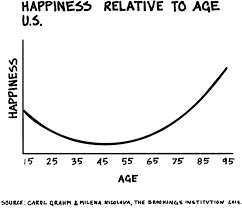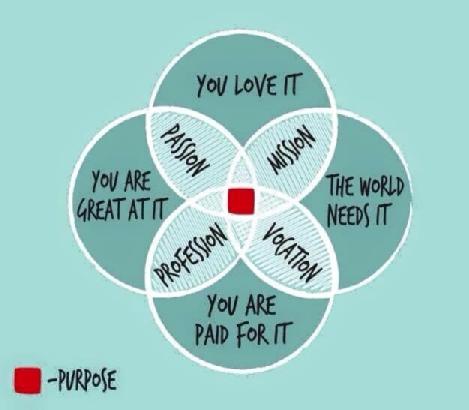Is There a “Capstone Career” in Your Future?

My “9-to-5” these days is writing resumes, developing LinkedIn profiles and networking strategies, and providing career transition assistance for mid-to-late career professionals, mostly in the healthcare space.
I’m fortunate to be able to connect with some very committed and talented folks on a pretty deep level as I help them with these components of their “career marketing campaigns.”
It’s not unusual to slide into a conversation about the “R” word, as in: “What are your thoughts about retirement?”
These folks usually have a time frame for the start of their retirement, either a specific year or a certain number of years beyond where they are now.
Not surprisingly, it almost always involves the number 65, reminding me of the strange entrenchment that number has in our collective psyche.
Even with a prospective date in mind, when asked what they expect to do with their retirement years or what retired life will look like for them, I invariably get the equivalent of a blank stare on the phone.
Few have a clue or have taken the time to think about it beyond the financial side – even though, for some, the decision is looming.
We’re stuck in 1935
I was reminded recently that “we created the clock and now it’s our master.” In the past, there was only the sun, moon, and stars and whatever creative notion about time that the priests and prophets came up with. Along the way, we came up with number boundaries with the 20th century producing 21 and 65 as the entry and exit points for participation in the adult world.
We get lots of guidance and advice and direction leading up to the first gateway. We drift out of the second gateway with little or no roadmap and a dearth of advice on what to do with the years that follow. We just know we need to do something resembling retirement at, or close to that number because that’s what “they” have been telling us now for 5-6 decades, keying off an irrelevant number established 86 years ago for political expediency.
A few decades ago when we typically only survived a handful of years beyond that second boundary, it wasn’t that big a deal. A commitment to a full-stop, leisure-based retirement made sense. But we screwed that up when we figured out how to live another 15-30 years beyond that.
We’ve technically invalidated the number 65 as a boundary but haven’t removed it from our heads.
Ignoring reality
If you ask these folks what concerns they may have about retirement beyond money, it typically will fall into one or more of these four categories:
- Boredom.
- Loss of identity.

- Becoming irrelevant.
- Deteriorating health
Yet, having identified their concerns, few have considered a plan designed to address them – all of which are addressable.
I’m committed to doing something about that.
How about a “Capstone Career?”
Mike Drak is a friend of mine, a self-proclaimed “retirement rebel” and author of two really good books on the topic of retirement: “Victory Lap Retirement: Work While You Play, Play While You Work” and “Retirement Heaven or Hell: Which Will You Choose. Nine Principles for Designing Your Ideal Post-Career Lifestyle.” I regret that Mike thought of “Victory Lap” first because it describes a great mindset for a post-career life.
I’ve been brainstorming for an equivalent term and came up with “Capstone Career”, with help from executive career coach, Helen Harkness, founder of Career Design Associates, who introduces the concept in her book “Don’t Stop the Career Clock: Rejecting the Myths of Aging for a New Way to Work in the 21st Century.”
I think a “Capstone Career” is a great solution to the aforementioned retirement concerns.
Why “capstone?” What is it?
Capstone has a couple of definitions:
- a stone fixed on top of something, typically a wall.
- the high point; a crowning achievement; a culminating experience.
Much like Drak’s “Victory Lap”, a Capstone Career could be that “crowning achievement and culminating experience” that celebrates the bringing together of dormant dreams, resurrected talents, accumulated skills, and experiences to create a life-enhancing, purposeful antidote to the hidden pitfalls of full-stop retirement.
Helen Harkness puts it this way:
“We can do this by concentrating on functional age – ignoring chronology and learning a new way to tell time, re-careering and rethinking retirement, moving from career crisis to career quest, creating and activating what I call a capstone career. By knowing what we want and doing what we love, we can continue life’s journey with creativity, wisdom, power, and purpose.”
Landing strip or launch pad?
Our culture says it’s time to land.
Our biology encourages a re-launch.
I’ll risk sounding like a broken record with the reminder that our biology offers us only two choices: growth or decay. Doesn’t 65 sound a bit like a decay-producing landing point or “use-by” stamp. It certainly has never carried the suggestion of a re-launch.
It’s interesting to note a 2018 report by the New England Journal of Medicine that found the most productive age in a human’s life is – drum roll, please – between the ages of 60 and 70.
It gets better. the second most productive age is between 70 and 80 and the third most productive decade is 50-60.
The “u-curve of happiness” study done by author Jonathan Rauch revealed that our happiness track hits bottom at around 47 and rises to its peak in the 70s and 80s.

Who knew?
I don’t need no stinkin’ job!
I get it – we can’t seem to rebrand “work” as anything other than a negative four-letter word. For the vast majority of us, work represents something that is a mismatch to our deepest skill set that we don’t truly enjoy and tolerate and endure for the money. We long to get away from it and do – what? Anything but work. Beyond that, the definition for most is fuzzy at best.
You aren’t going to be told by your financial planner or your government the truth that work is pivotal to achieving a longer, healthier life. We are encouraged to move to the wrong side of the biological ledger, become consumers rather than producers, and wind down at a time that the combination of our talent, wisdom, skills, and experiences may be at a peak. That puts us on the down-slope and accelerates the “live too short and die too long” model that characterizes the majority of our retired population.
A capstone Career is not a job. It’s a response to a “calling” or satisfaction of a “quest.” It doesn’t even need to be designed to make money although it can be. Above all it combines three simple principles:
- Doing what you really, really want to do.
- Doing what you are really, really good at.
- Providing something the world needs.

Making money at it may be necessary for some. But the heart of a Capstone Career is to retain or recover relevance, to avoid boredom, re-establish identity, and to place oneself on a track that avoids the deterioration of health that accompanies a purposeless retired life.
Stay tuned. More to come on this topic. Share your thoughts on this concept with a comment. We value your input.





I have been so fortunate that I retired at 40 instead of 65. I am not wealthy, but due to a retirement that felt more forced than real, life gave me the nudge I needed to make that decision early. Since then I have found my life’s passion. My work has become my golf game. I get up every day and look forward to helping people get out of pain and start enjoying their life. At 61, I have plans for retirement as I feel like I am in retirement now. I get to do what I want when I want and still paid with all the fun of creating more wealth through marketing and production ideas. I spent the first 20 years on a job I hated. I have spent the last 20 years doing work I love. At my age, I have another 20, at least, to continue doing the work I love and teach others how to do the same.
Butch, your story has stuck in my brain ever since you shared it with me many months ago. We need to connect again and catch up. Let’s Zoom it up soon.
Good Topic Gary! I don’t view it as a second chance. I view it as a natural progression of a wonderful life. I’m lucky, I love my work, I love my skiing, I love my camping & hiking, I love my biking, I love my family, & I was taught by my Dad that we evolve rather than retire. Thanks for being a voice that resonates and reinforces my path.
Hey Chip – I admire that about you. As we’ve kicked around, not everybody finds that progression. I like the evolve vs retire – I’m going to steal that! Thanks for chiming in!
Hi Gary,
Thought I would comment on my search so far…. I have retired. 4 years ago at age of 64 do to decreased vision an inability to be at the top of my profession…. I have had many dead ends trying to make hobbies into jobs. They are not as much fun when you do them for money… no matter how little…. As I am between jobs I think I will avoid my past joys and try something else… One of the good parts of “retirement “ is that it does give you time to try different things without pressure to “Get a Job”
Bob, I help people create their Essence statement resulting in jobs that fit you like a glove!
The quality of our lives is directly related to how fully we honor the essence of who we are.
I appreciate what you are saying about hobbies, Bob. I once wanted to open a fly fishing shop because of my passion (now diminished) for the sport but a handful of wise fly shop owners discouraged me and warned me against turning a hobby into drudgery and destroying my love for it. Keep exploring. The exploration itself is part of staying vital – looking for new things, stepping out to the edge with something new. I appreciate the attitude with which you are approaching this retirement phase.
Great read Gary! I’ll be including this in my next newsletter.
I feel like nobody cares what I think. I have been successful and knowledgeable in many areas, that I would be more than happy to volunteer. I have been told that I don’t know anything from my children, especially. In the past they have relied on me to write their resumes, be a nanny to my grandchildren, and financial support. Now that they are successful, which I am grateful they are, I have no use to them. I don’t know how to be useful to myself either. I feel like it is better to just live out my years and die.
It’s a shame you don’t have a donate button! I’d most certainly donate to this outstanding blog! I guess for now i’ll settle for bookmarking and adding your RSS feed to my Google account. I look forward to new updates and will talk about this website with my Facebook group. Talk soon!
To the makeagingwork.com admin, Your posts are always well-supported by facts and figures.
Hello makeagingwork.com owner, Keep sharing your knowledge!
Dear makeagingwork.com owner, You always provide clear explanations and step-by-step instructions.
What i don’t realize is actually how you’re not really much more well-liked than you might be now. You’re so intelligent. You realize thus considerably relating to this subject, produced me personally consider it from a lot of varied angles. Its like women and men aren’t fascinated unless it’s one thing to accomplish with Lady gaga! Your own stuffs excellent. Always maintain it up!
Hi makeagingwork.com webmaster, Good to see your posts!
Hello makeagingwork.com administrator, Your posts are always well structured and easy to follow.
Dear makeagingwork.com administrator, Your posts are always well-supported by facts and figures.
To the makeagingwork.com owner, Keep it up!
Hello makeagingwork.com admin, You always provide clear explanations and step-by-step instructions.
Dear makeagingwork.com owner, Your posts are always insightful and valuable.
Dear makeagingwork.com admin, Keep it up!
Dear makeagingwork.com administrator, Thanks for the well-structured and well-presented post!
Dear makeagingwork.com webmaster, Your posts are always well-supported by research and data.
What a great concept Gary! I am currently designing my own Capstone Career. As a Life Transition Strategist and Midlife Redesign Mentor, I work with men and women, in all stages of their life, to Reawaken their lost dreams and ambitions, Refine their life, by becoming clear about what they truly want for their life and eliminating what is not working, and Redesigning their life by taking action on what fulfills them and bringing it to life. Works like yours and Mike’s, are full of wisdom. Look forward to more!…(websites are currently being redesigned!)
This article couldn’t be more timely. I am in the 50-60 age bracket and am trying to figure what comes next. I don’t want to stop and do nothing, just find something that makes me happy and fulfilled every day. I need something to give my purpose self a bit more love! The pandemic certainly has give me pause to make that promise to myself.